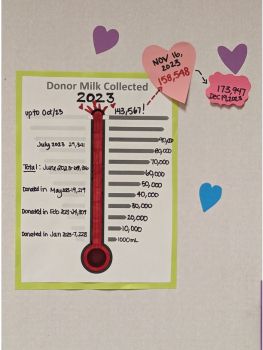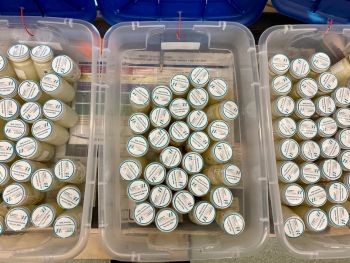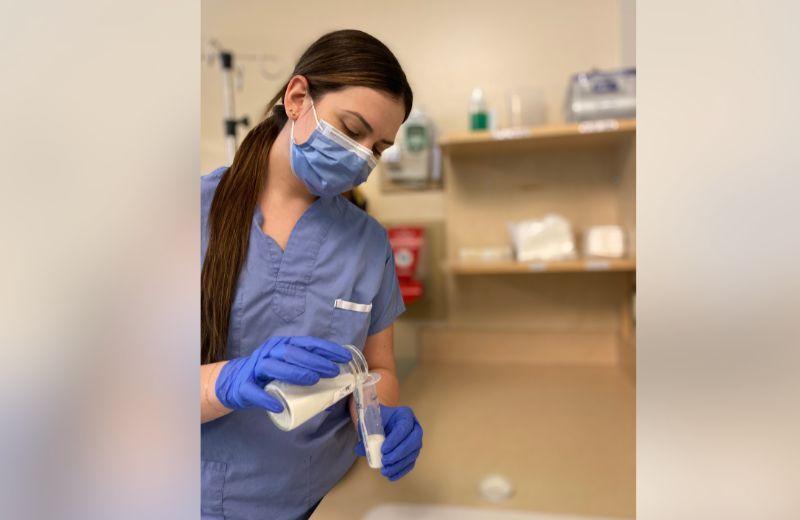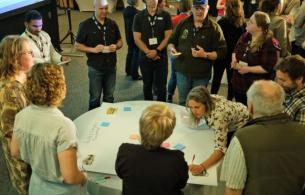2023 was a record-breaking year for human milk donations in Northern BC! Staff working in the Neonatal Intensive Care Unit (NICU) at the University Hospital of Northern BC (UHNBC) in Prince George are thrilled and so thankful to the donors. Emily Fetterly is a NICU Nurse at UHNBC.
“Donor milk is extremely beneficial for our babies,” said Fetterly. “When their parents’ own milk is not yet available, our smallest and youngest patients get to start their feeding journeys with something easy on their tummies and protective of their health. This is such a victory.”

On average, six to eight babies per month received pasteurized donor human milk while in the NICU in Prince George in 2023.
“I’ve heard from countless families that are so grateful for donor milk – it’s one less stress for them during their time in the NICU,” said Fetterly. “When I think about all the donors who have taken their time and resources to provide their milk for our patients, it truly warms my heart.”
Every drop counts
In 2023, 10 approved donors from Northern BC donated a total of 173,947 mL* of milk via the milk collection depot at the NICU. If we convert this to ounces (30 mL = 1 fluid ounce), this is over 5,798 ounces total, or an average of 579 ounces per donor. Of course, the amount donors can give varies a lot. While some can give much more than others, we appreciate every drop!
What does that look like in terms of time and effort? Let’s assume that a donor collects about four ounces each time they pump their milk. This means that on average each of the 10 donors pumped 145 times, or once per day for almost five months, to provide all this milk in 2023. What a gift!

“If I could personally thank each donor, I would,” said Fetterly. “They take the time to pump extra milk and deliver it to the NICU, and then we ship it to the milk bank in Vancouver to be pasteurized. Their time and commitment have a considerable impact on the early days of our tiniest and sickest patients.”
Breaking records
In 2023, donors in Northern BC gave more milk than ever before. For comparison, in the preceding years, the NICU collected between 88,100 mL and 113,300 mL (or 2,979 oz to 3,777 oz*). At almost 174,000 mL, the 2023 totals are about 170 per cent of recent annual donation averages. These numbers would be even higher, about 200 per cent, if we included the 28,700 mL of late 2023 donations the UHNBC NICU sent to Vancouver on January 16 (though the milk bank will instead include this in their 2024 numbers).

“At the end of my 12-hour shift, if my patient is on donor milk, one
of the last things I do is thaw milk for the next shift,” explained Fetterly. “I open the freezer and see the bins that contain all the little bottles of donor milk – it always astounds me that we offer this service. The donors’ generosity is life-changing. I hope they know how large of an impact they’re making in people’s lives.”
Will this impact grow further in 2024? With the generosity of our donors, who knows? Maybe we’ll break records again this year.
Feeling inspired?
If you or someone you know might be interested in donating milk, check out these resources:
- Donor human milk - Northern Health
- Milk donations are up! Prince George NICU on track to break their milk collection record - Northern Health Stories
- Got milk? Northern moms donate to human milk bank for babies in need - Northern Health Stories
- Got milk? Vulnerable Northern babies receive donor milk from provincial human milk bank - Northern Health Stories
*Numbers differ slightly from provincial milk bank records, totaling 160,000 mL for 2023 donations. This figure is slightly lower than our tally as they are rounded down to account for the weight of bags/bottles and potential waste when transferring between containers while processing.














Comments